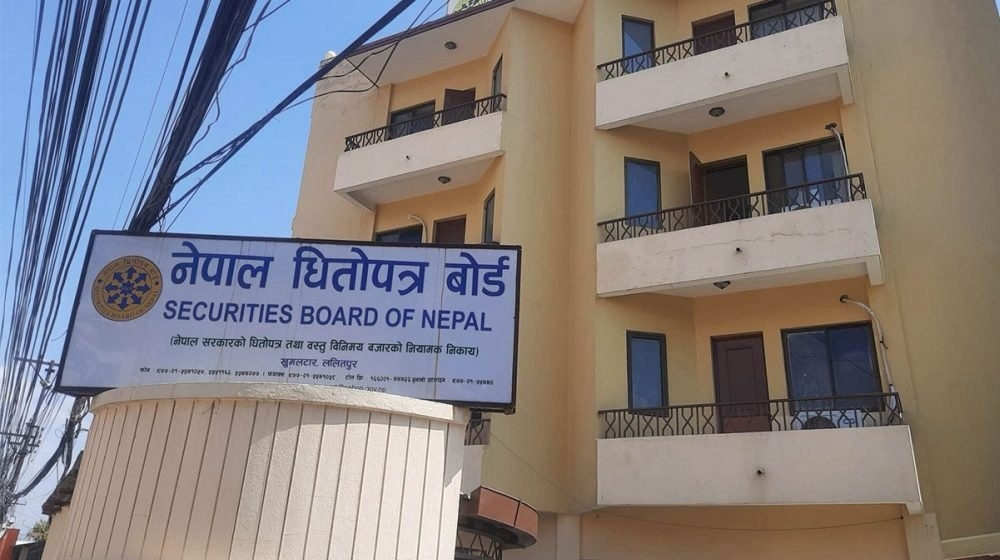

KATHMANDU: The Securities Board of Nepal (SEBON) has denied allegations that its chairman, Santosh Narayan Shrestha, demanded commissions for approving Initial Public Offerings (IPOs).
In a statement issued on Tuesday, the SEBON called the reports baseless and challenged anyone with credible evidence of financial or other illegal benefits involving the chairman to come forward with factual details. SEBON said legal action would be taken against anyone found guilty, but only if substantiated evidence is presented.
The SEBON described the claims, circulating some media outlets and social media platforms, as fabricated, misleading, and part of a coordinated campaign aimed at undermining the regulator’s credibility. SEBON argued that these allegations are a response to recent reforms initiated in the capital market and are designed to erode public trust and discourage general investors.
The controversy arises amid a massive IPO pipeline. According to SEBON, 89 companies are currently awaiting IPO approval, with applications collectively worth Rs 56.79 billion. Among them, 43 hydropower companies alone are seeking approval to issue 199.36 million shares valued at Rs 19.44 billion. These are the same companies linked to the unverified claims that the chairman solicited kickbacks in exchange for clearing their IPOs. The SEBON insists that the process is rigorous and evidence-based.
SEBON spokesperson Niranjay Ghimire stated that the delays are due to due diligence and technical evaluations. He said that over a dozen companies have received approval since Shrestha assumed office, and that applications are being processed carefully to protect investors. He stressed that approvals are granted only after detailed study and verification of company documents.
In September 2024, the Securities Board of Nepal (SEBON) announced that it would no longer approve Initial Public Offerings (IPOs) of companies with a net worth below Rs 90 per share, although it clarified that applications already in process would not be halted.
This decision followed a directive from the Public Accounts Committee, which had instructed SEBON to refrain from approving IPOs of companies failing to meet the Rs 90 net worth threshold. The directive triggered widespread concern among investors and stakeholders in the capital market, leading to complaints submitted to the Finance Committee and prompting further deliberations.
For financially weaker companies, SEBON stated that it would conduct additional assessments before making final decisions. The Rs 90 threshold underscores a growing concern over the approval of IPOs by loss-making companies, which has adversely impacted ordinary investors.
The Finance Committee has also urged SEBON to prioritize this approach in future IPO approvals. During discussions, several committee members criticized SEBON’s leadership for its past decisions, blaming the board for the declining confidence of investors and alleging a lack of accountability at the top.
Despite the mounting scrutiny, SEBON maintains that its decisions remain independent, transparent, and aligned with legal and regulatory standards.
Several hydropower companies—including Himstar Energy Company Limited, Bhujung Hydropower Limited, Daramkhola Hydro Energy Limited, Sanima Hydropower Limited, Sanvi Energy Limited, and Beni Hydropower Limited—are currently in the pipeline for IPO approval by the Securities Board of Nepal (SEBON). Other applicants include Solu Hydropower Limited, Taksar Pikhuwa Khola Hydropower Limited, Kalinchowk Hydropower Limited, Yamling Hydropower Limited, and Mabilung Hydropower Limited.
For the past one and a half years, SEBON has not approved IPOs for companies with a net worth of less than Rs 90 per share, in compliance with a directive issued by the Public Accounts Committee of the House of Representatives. As a result, hydropower companies—collectively seeking to raise Rs 19.44 billion through IPOs—have faced delays in securing regulatory approval. Promoters argue that the holdup has made it difficult for them to raise capital from public investors, thereby affecting their ability to meet loan repayment obligations.
In response to the ongoing stalemate, the Independent Power Producers’ Association of Nepal (IPPAN) formed a 15-member committee on Tuesday to initiate protest preparations. The decision followed a meeting of affected entrepreneurs.
Since assuming the chairmanship of SEBON, Santosh Narayan Shrestha has sought to exercise greater regulatory scrutiny, particularly targeting financially weak companies in the hydropower sector. His approach includes detailed financial health assessments to prevent unviable firms from raising funds through public offerings. This increased oversight has triggered backlash from some hydropower promoters, who have launched public and media campaigns accusing Shrestha of obstruction, part of what SEBON sources describe as a coordinated defamation effort.
Currently, more than 26% of companies listed on the Nepal Stock Exchange (NEPSE) are loss-making, yet their share prices remain disproportionately high—a sign of market manipulation by certain interest groups. SEBON has pledged to take stronger action to curb this trend and restore credibility to the capital market.
Many companies that secured IPOs approval in previous years had presented overly optimistic financial projections in their prospectuses, including anticipated profit growth. However, rather than meeting these expectations, many have reported worsening losses post-listing. Their financial statements, which appeared sound prior to the IPO, now tell a far bleaker story.
Chairman Shrestha’s efforts to block financially unfit companies from issuing IPOs have drawn criticism from vested interests, but SEBON maintains that such reforms are essential to protect ordinary investors and prevent future market manipulation.